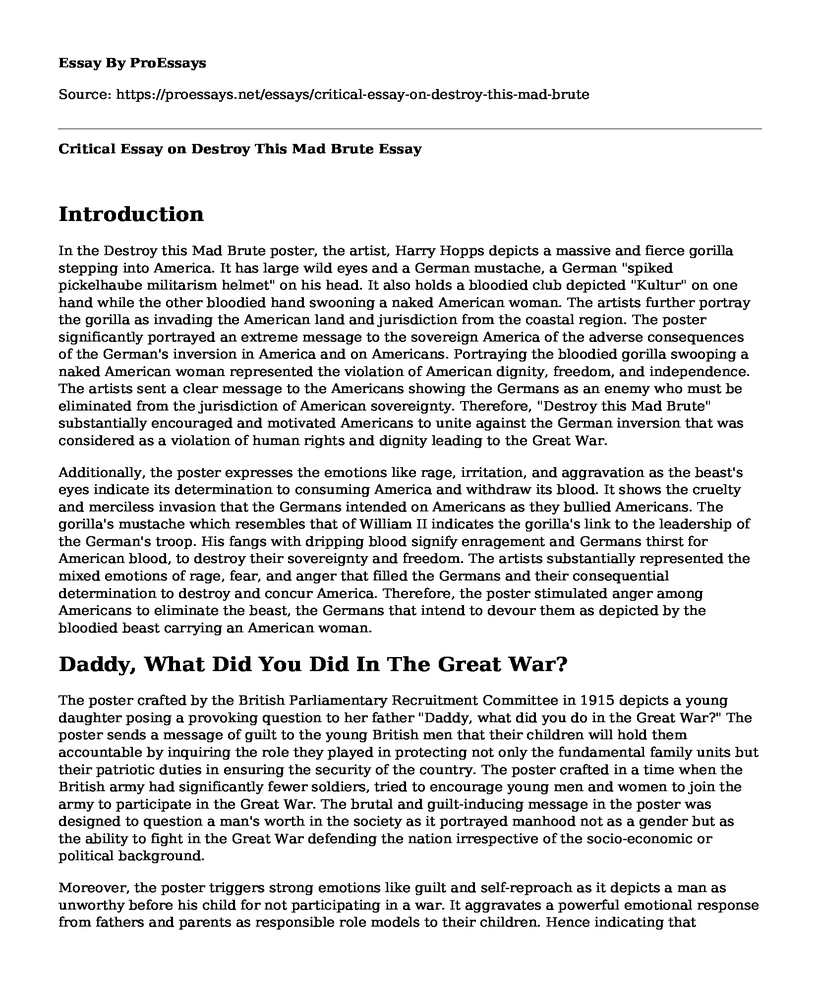Introduction
In the Destroy this Mad Brute poster, the artist, Harry Hopps depicts a massive and fierce gorilla stepping into America. It has large wild eyes and a German mustache, a German "spiked pickelhaube militarism helmet" on his head. It also holds a bloodied club depicted "Kultur" on one hand while the other bloodied hand swooning a naked American woman. The artists further portray the gorilla as invading the American land and jurisdiction from the coastal region. The poster significantly portrayed an extreme message to the sovereign America of the adverse consequences of the German's inversion in America and on Americans. Portraying the bloodied gorilla swooping a naked American woman represented the violation of American dignity, freedom, and independence. The artists sent a clear message to the Americans showing the Germans as an enemy who must be eliminated from the jurisdiction of American sovereignty. Therefore, "Destroy this Mad Brute" substantially encouraged and motivated Americans to unite against the German inversion that was considered as a violation of human rights and dignity leading to the Great War.
Additionally, the poster expresses the emotions like rage, irritation, and aggravation as the beast's eyes indicate its determination to consuming America and withdraw its blood. It shows the cruelty and merciless invasion that the Germans intended on Americans as they bullied Americans. The gorilla's mustache which resembles that of William II indicates the gorilla's link to the leadership of the German's troop. His fangs with dripping blood signify enragement and Germans thirst for American blood, to destroy their sovereignty and freedom. The artists substantially represented the mixed emotions of rage, fear, and anger that filled the Germans and their consequential determination to destroy and concur America. Therefore, the poster stimulated anger among Americans to eliminate the beast, the Germans that intend to devour them as depicted by the bloodied beast carrying an American woman.
Daddy, What Did You Did In The Great War?
The poster crafted by the British Parliamentary Recruitment Committee in 1915 depicts a young daughter posing a provoking question to her father "Daddy, what did you do in the Great War?" The poster sends a message of guilt to the young British men that their children will hold them accountable by inquiring the role they played in protecting not only the fundamental family units but their patriotic duties in ensuring the security of the country. The poster crafted in a time when the British army had significantly fewer soldiers, tried to encourage young men and women to join the army to participate in the Great War. The brutal and guilt-inducing message in the poster was designed to question a man's worth in the society as it portrayed manhood not as a gender but as the ability to fight in the Great War defending the nation irrespective of the socio-economic or political background.
Moreover, the poster triggers strong emotions like guilt and self-reproach as it depicts a man as unworthy before his child for not participating in a war. It aggravates a powerful emotional response from fathers and parents as responsible role models to their children. Hence indicating that becoming an integral and responsible parent entailed performing the patriotic duties of defending the nation against external attacks such as the Great War despite not being a professional soldier. The poster placed considerable pressure on men portraying those who did not volunteer as shirkers and cowards of the society. Therefore, to avoid negative branding, many men volunteered for recruitment in the Great War.
Cite this page
Critical Essay on Destroy This Mad Brute. (2022, Nov 22). Retrieved from https://proessays.net/essays/critical-essay-on-destroy-this-mad-brute
If you are the original author of this essay and no longer wish to have it published on the ProEssays website, please click below to request its removal:
- The Spare Parts Movie Review
- Reconstruction Ideas Essay Example
- Essay on Slavery and Freedom in the New Republic (1783-1829)
- Animated Existentialism Paper Example
- Paper Example on 70s: Rapid Change in Society: A Look at 4 Articles
- Essay Example on The Life of Arnold Schoenberg: An Aussie-American Composer's Rise From Humble Beginnings
- Essay on 1800s US Presidential Election: John Adams vs Thomas Jefferson







